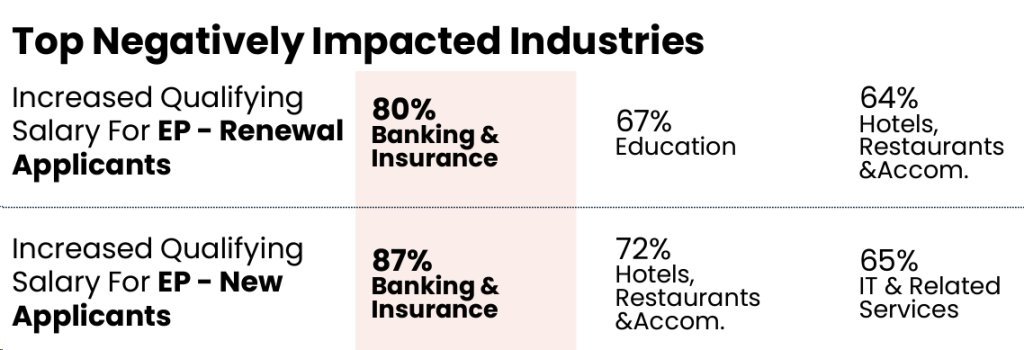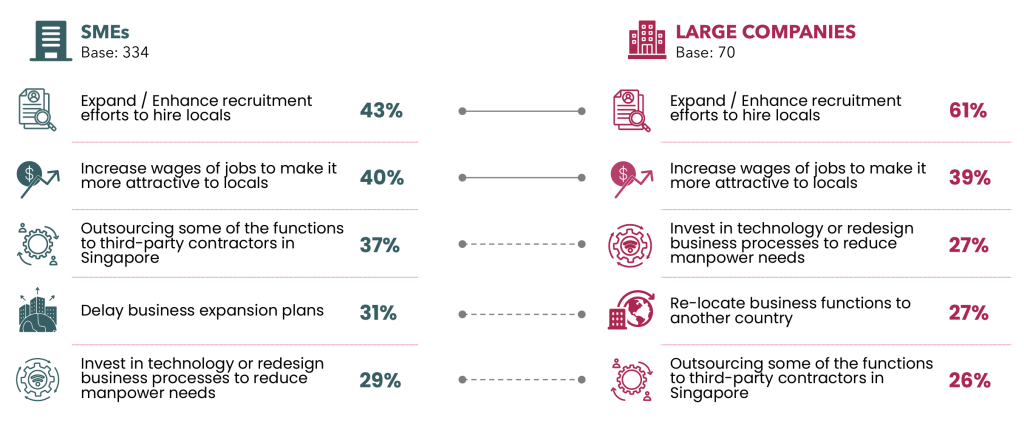Where can you demand more? SBF survey reveals 7 industries desperate to employ S’poreans.
You would not only have a better chance of landing a job in these industries, but also higher bargaining power for your salary.

Disclaimer: Unless otherwise stated, any opinions expressed below belong solely to the author.
Continuing the findings from Singapore Business Federation (SBF)’s survey, following forecasts regarding salaries we reported yesterday, let’s look at which industries are starved of Singaporean talent.
You would not only have a better chance of landing a job in these industries, but also higher bargaining power for your salary, whether you’re just applying or are already employed.
Looking at the challenges reported by employers, companies in seven sectors are most impacted by the shortage of local high-skilled talent. In six sectors, a whopping 3/4 of the businesses report problems finding qualified Singaporeans.
Furthermore, 60 to 65 per cent of companies within three out of the seven sectors reported problems in attracting and retaining local talent—though that may be read in two ways: either as an opportunity (due to greater hiring challenges) or a red flag (if others are not sticking around, why should you?).
Challenges reported by industry
| Sector | Limited pool of local high-skilled labour | Attracting and/or retaining local high-skilled labour |
| IT & Related Services | 77% | 59% |
| Education | 76% | 65% |
| Construction & Civil Engineering | 74% | 53% |
| Logistics & Transportation | 74% | 49% |
| Professional Services | 74% | 46% |
| Banking & Insurance | 74% | 30% |
| Retail Trade | 65% | 61% |
| Manufacturing | 57% | 41% |
| Wholesale Trade | 55% | 36% |
| Other Financial & Insurance | 50% | 45% |
| Admin & Support Services | 48% | 33% |
| Hotels, Restaurants & Accommodation | 46% | 27% |
| Health & Social Services | 44% | 33% |
| Real Estate Activities | 27% | 20% |
As you can see, the sectors facing a shortage of local high-skilled talent cover quite a wide array of services: from technical IT, through education and professional services, civil engineering and logistics, to the usual banking and insurance.
A large number of people should be able to find something attractive for themselves. If you’re qualified for the job, your leverage will be the biggest here.
Immigration squeeze
Additionally, some of these industries are also negatively affected by the tighter immigration criteria—chiefly the rising qualifying salaries for Employment Pass holders for both newcomers and those who need their passes renewed:
 Source: Singapore Business Federation
Source: Singapore Business FederationOut of the seven on our original list, two—Banking and IT—are among the most affected by these changes (unfortunately SBF did not provide a breakdown for all industries in this case).
Taken together, these three factors create a squeeze on the workforce that is available to companies in these sectors.
Firstly, there’s a shortage of good Singaporean workers to begin with. Secondly, the competition in these businesses creates problems in retaining them, even when they get hired. And finally, the pool usually tapped in such cases—foreign workers—is also getting limited by new immigration rules.
This creates an employees’ market condition, where workers have an advantage over employers—they are more free to pick the right companies and demand better working conditions. Notably, this is not limited only to new hires, but current workers as well.
As “shopping around” is easier, given the relative wealth of options, it’s easier to bargain for a higher raise to just stay on the team.
Pay up
Of course, there are also alternative ways employers can deal with these challenges, including outsourcing work abroad, which bypasses both the need to hire or import foreign labour to Singapore.
That said, it’s still a less preferable option to businesses, more of which still consider raising wages than moving jobs abroad (in one way or another).
 Source: Singapore Business Federation
Source: Singapore Business FederationAround 40 per cent of the polled companies, both big and small, plan to raise pay to attract more locals. 37 per cent of SMEs consider foreign outsourcing, but only a quarter of big businesses do, either through offshoring to third parties, or moving some work functions out of Singapore.
Unfortunately, we don’t have a specific breakdown per industry here, which could indicate even higher willingness to pay more in those most affected.
Nevertheless, given how concerned businesses are about finding suitable locals, this opens up opportunities for you to simply offer yourself to prospective employers and see the offers they come back to you with.
Then, you can see how valued you are by your current boss, and pick the best offer in terms not only of money but also work-life balance.
Amid the shortage of employees, companies become considerably more generous, especially in high-value sectors like IT or finance.
Find out more about SBF’s National Business survey here. Read other articles we’ve written on the job landscape here.Featured Image Credit: Freepik

 Lynk
Lynk 






























